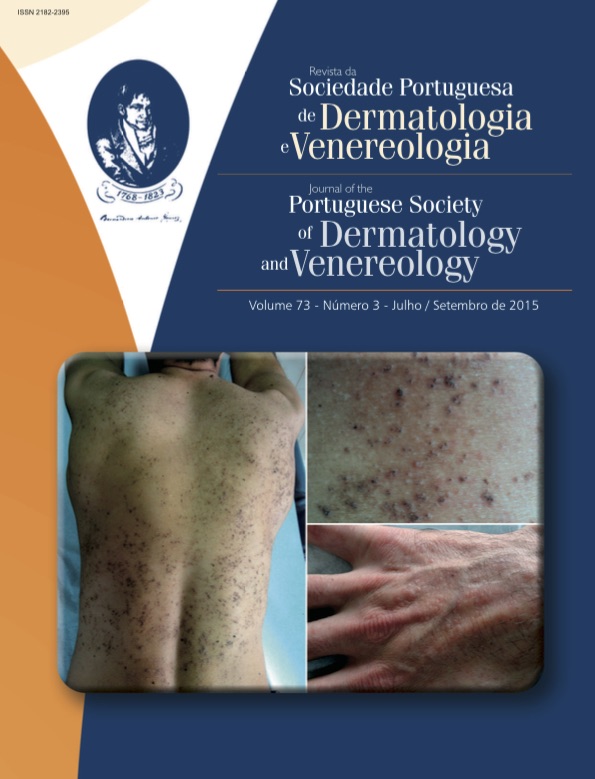ZOON BALANITIS - REVIEW OF 23 CASES
Abstract
Introduction: Zoon balanitis or balanitis circumscrita plasmocellularis is a chronic disease of unknown etiology, described mainly in middle-aged or elderly uncircumcised men.
Objectives: Characterization of the clinical variables and the response to treatment in patients with histological diagnosis of Zoon balanitis in Hospital de Santa Maria between January 1th 2009 and December 31th 2014.
Results: The sample included a total of 23 patients, aged 65 (±11) years old. The clinical differential diagnoses more frequently set were erythroplasia of Queyrat and lichen sclerosus. Concerning therapy most of the patients applied corticosteroids or were submitted to circumcision. From the five patients and the only patient in which CO2 laser therapy was used there is no evidence of recurrence. Of the remaining 17 patients, 4 are under disease progression over corticosteroids topical treatment.
Conclusion: Although Zoon balanitis is generally considered a benign condition, the differential diagnoses with squamous cell carcinoma makes the histological confirmation, follow-up and surveillance of this entity mandatory. The persistence of this disease with topical treatments makes chirurgical intervention the gold standard approach in the treatment of these patients.
Downloads
References
Abdennader S, Casin I, Janier M, Morel P. Balanitis and balanoposthitis: a review. Genitourin Med. 1996;
:453-4.
Zoon JJ. Balanoposthite chronique circinscrite bénigne à plasmocytes. Dermatologica. 1972;105:1-7.
Altmeyer P, Kastner U, Luther H. Die Balanitis/Balanoposthitis chronica circumscripta benigna plasmacellularis -
Entitat oder Fiktion? Hautarzt. 1998; 49:552-5.
Pastar Z, Rados J, Lipozencić J, Skerlev M, Loncarić D. Zoon plasma cell balanitis: an overview and role of
histopathology. Acta Dermatovenerol Croat. 2004;12:268-73.
Hugh JM, Lesiak K, Greene LA, Pierson JC. Zoon's balanitis. J Drugs Dermatol. 2014; 13:1290-1.
Weyers W, Ende Y, Schalla W, Diaz-Cascajo C. Balanitis of Zoon: a clinicopathologic study of 45 cases. Am J Dermatopathol. 2002; 24:459-67.
Joshi UY. Carcinoma of the penis preceded by Zoon’s balanitis. Int J STD AIDS. 1999; 10:823–5.
Balato N, Scalvenzi M, Serena La Bella S, Di Costanzo L. Zoon’s balanitis: benign or premalignant lesion? Case
Rep Dermatol. 2009; 1:7-10.
Yoganathan S, Bohl TG, Mason G. Plasma cell balanitis and vulvitis (of Zoon). A study of 10 cases. J Reprod Med.
; 27:939-44.
Balkwill F, Mantovani A. Inflammation and cancer: back to Virchow? Lancet.2001; 357:539-45.
Ferrandiz C, Ribera M. Zoon’s balanitis treated by circumcision. J Dermatol Surg Oncol.1984; 10:622.
Altmeyer P, Kastner U, Luther H. Balanitis/balanoposthitis chronica circumscripta benigna plasmacelularis – entity or fiction? Haurtartz 1998; 49:552-5.
Haneke E. Skin disease and tumors of the penis. Urol Int. 1982; 37:172.
Kyriakou A. Patsatsi A, Patsialas C, Sotiriadis D. Therapeutic efficacy of topical calcineurin inhibitors in plasma
cell balanitis: Case series and review of the literature. Dermatology. 2014; 228:18-23.
Peterson CS, Thomsen K. Fusidic acid cream in the treatment of plasma cell balanitis. J Am Acad Dermatol.
; 27:633-4.
Retamar RA, Kien MC, Chouela En. Zoon’s balanitis: presentation of 15 patients, five treated with a carbon
dioxide laser. Int J Dermatol. 2003; 42:305-7.
Wollina U. Ablative erbium:YAG laser treatment of idiopathic chronic inflammatory non-cicatricial balanoposthitis
(Zoon's disease) - a series of 20 patients with long-term outcome. J Cosmet Laser Ther. 2010;12:120-3.
All articles in this journal are Open Access under the Creative Commons Attribution-NonCommercial 4.0 International License (CC BY-NC 4.0).








